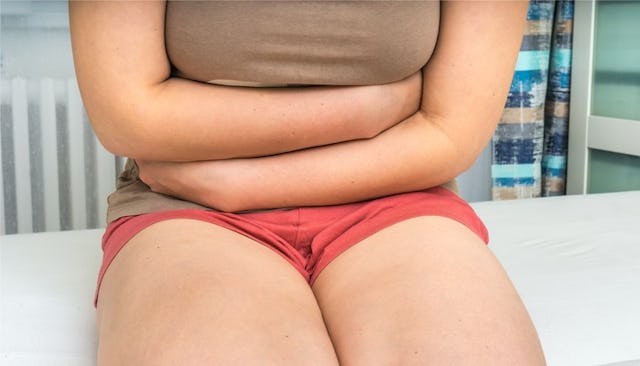Parenting With IBS Really Freaking Sucks

I’d always had a sensitive tummy, but the early years of motherhood brought the whole thing to a new, gut-wrenching level.
Soon after my son was born, I started getting awful diarrhea once or twice a month — the kind that makes you feel like you’re vomiting from your butt (sorry for the TMI, but it’s 100% true). It was painful as all hell and left me feeling depleted and woozy. I kept blaming it on hormones, sleep deprivation, or “something I ate” and hoping it would just resolve on its own.
RELATED: How To Stop Diarrhea Quickly, Because No One Has Time For This Crap
But then, when my son was 2 1/2, it started happening every freaking day, to the point where I was afraid to leave the house. I don’t think there’s any good time to be dealing with chronic, painful diarrhea, but having to rush to the bathroom repeatedly while a cranky toddler is at your feet (and often watching you reel on the toilet) is pretty much the worst thing ever.
Considering he was only a small child and basically had no clue what was going on with me, I would say my son was quite patient. There were times we’d be going somewhere, and I’d have to pull the car over and sprint to the bathroom. There were mornings where plans had to be canceled because “Mommy’s tummy wasn’t right,” and I had to shove him in front of the TV for hours until I was able to function again.
The symptoms of my IBS were terrible on their own, but having to parent through it all was maybe the worst part. For the months that I felt chained to my house — when I felt like I couldn’t arrange playdates or other outings for fear of my gut acting up — I felt so guilty. I hated that my life had to revolve around my intestines instead of my son, and that I was so preoccupied with it.
I worried that my anxiety would rub off on him. It was a burden I didn’t want him to bear. In essence, I couldn’t be the mom I wanted to be, and it tore me in half.
After consulting several doctors and specialists, I eventually figured out that I needed to overhaul my diet to get better. I eliminated all dairy (boohoo, I love cheese) and started following the low-FODMAP diet (look into it if you have IBS; it helps up to 75% of sufferers).
The dietary changes worked; the majority of my symptoms were gone. But I learned that stress was also a major contributing factor for IBS. And even after my gut settled down, I still had residual stress and anxiety surrounding my IBS and how to parent through it. And that stress took years to resolve.
I’d get flare-ups from time to time (I still do), and I’d worry over again about my son feeling like he didn’t have a normal mom or a normal life. As he got older, he began to understand more. It crushed me that he would say things like, “Mom, make sure you don’t eat anything you shouldn’t. I don’t want to be late for school again.”
I was probably too sensitive about the whole thing. I see that now, a bunch of years removed from the worst of it. I have now accepted that this is just who I am — someone who will always have a sensitive digestive system, who needs to eat a certain way to keep things under control, and who sometimes has flare-ups that last a few days and totally suck.
I don’t blame myself anymore, and that is huge. And the best news is that my son and I got through the worst of it. In fact, he is totally fine, and the missed playdates and tardy school mornings haven’t done any actual harm. If anything, this has taught him that life doesn’t always go according to plan, and that’s okay.
Most of all, living with a mom who has a chronic condition has taught my son compassion. He knows how to give me space when I need it. He doesn’t complain or focus on his own problems when I’m not feeling well. He’s not generally a touchy-feely kind of kid, but when I’m not well, he always asks him how I am and offers to help me out.
I have another son now too, and my older son — who saw me suffer through the worst of my IBS — takes care of my younger son when I’m dealing with a flare-up. It’s a beautiful thing, not just because it’s great to have the extra help, but also because I love watching my son take care of his little brother and himself — so that I can take care of me.
This article was originally published on